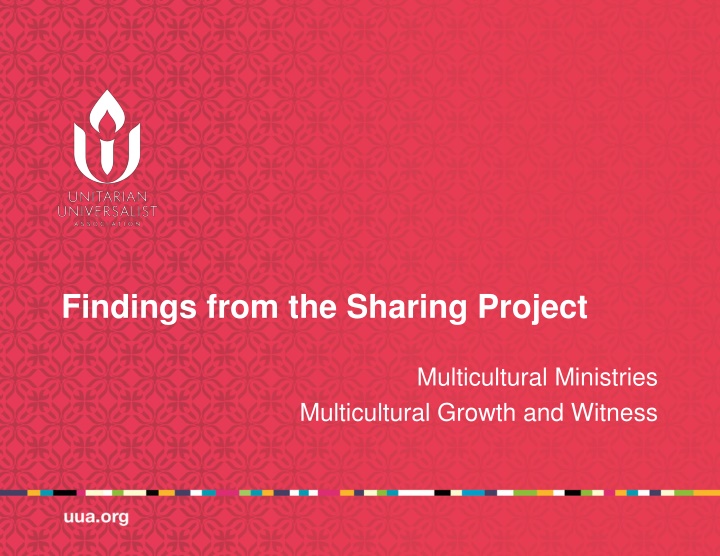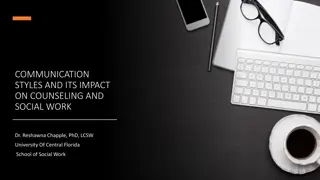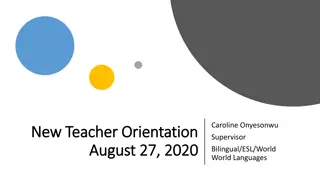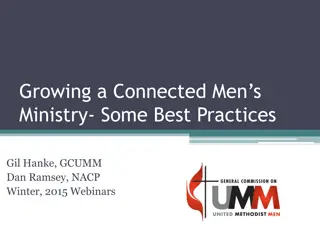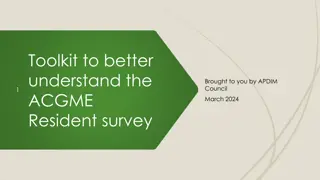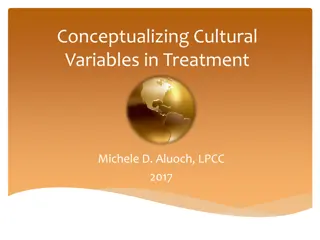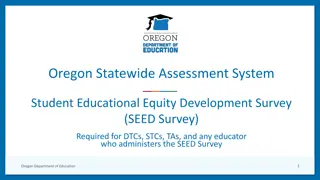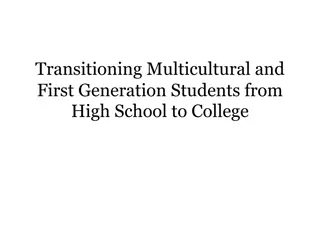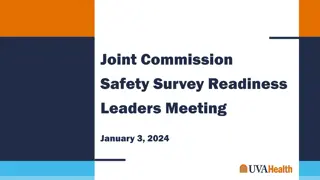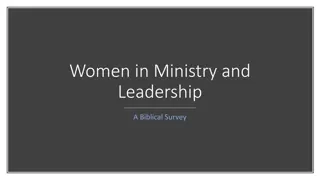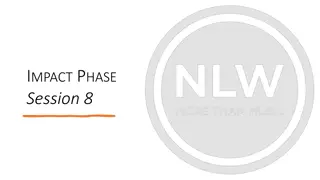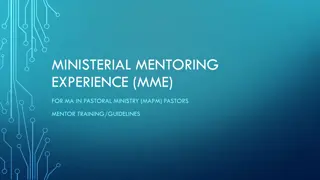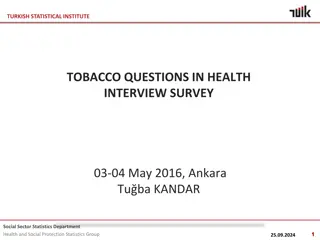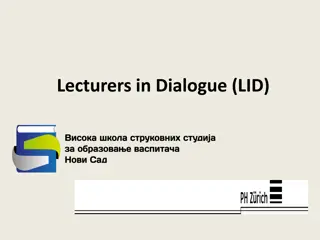Insights from Multicultural Ministry Growth Survey
Findings from the Sharing Project Multicultural Ministries reveal data and insights gathered from Unitarian Universalists historically marginalized by different factors, aiming to understand their unique experiences, needs, and challenges within Unitarian Universalism. The survey collected 1,500 responses from diverse regions, shedding light on demographics, discrimination faced, and the importance of inclusive practices within congregations. The report delves into various aspects such as demographics, discrimination, faith relationships, social justice, and preparation for future challenges, providing valuable information for congregational leaders and the Unitarian Universalist Association.
Download Presentation

Please find below an Image/Link to download the presentation.
The content on the website is provided AS IS for your information and personal use only. It may not be sold, licensed, or shared on other websites without obtaining consent from the author.If you encounter any issues during the download, it is possible that the publisher has removed the file from their server.
You are allowed to download the files provided on this website for personal or commercial use, subject to the condition that they are used lawfully. All files are the property of their respective owners.
The content on the website is provided AS IS for your information and personal use only. It may not be sold, licensed, or shared on other websites without obtaining consent from the author.
E N D
Presentation Transcript
Findings from the Sharing Project Multicultural Ministries Multicultural Growth and Witness
Launched in July 2013 To solicit input through a survey from Unitarian Universalists (UUs) historically marginalized by: Ability Sexual orientation Gender identity/expression Race, and/or ethnicity About their unique experiences and ministry needs within Unitarian Universalism
Goal To help congregational leaders and Unitarian Universalist Association staff understand Where We Are Now and What We Need to be well-equipped to meet the ministry needs of people seeking a liberal religious home in the 21st century
Sharing Project Report Demographic Profile Age Geography Education Employment Financial Status and Income Class Relationships and Family Households Caregiving Parenting Identities and Marginalization Sexual Orientation Gender Identity People with Disabilities Experiences of Discrimination in the World
Sharing Project Report Religion and Faith Relationship with UU Congregations Unitarian Universalist Theology Pastoral Care Needs Adult Religious Education Children s Religious Education Role of Social Justice Preparation to Face the Moral/Ethical/Spiritual Challenges of the Future Welcome and Inclusion In Congregations LGBTQ Welcome and Inclusion Welcoming Congregation Program Race and Ethnicity Welcome and Inclusion People with Disabilities Welcome and Inclusion Reflections about Sharing Circles
1,500 responses from forty-eight U.S. states and nine other countries All five UUA regions Ages from 14-92 (22% youth and young adults) 27% people of color 56% people with disabilities 55% LGBTQ Contextualizing the Survey DEMOGRAPHIC HIGHLIGHTS
Discrimination Respondents face discrimination every day Subject to slurs or jokes Poor service in retail Rejected by friend or family Unwelcome at religious organization Treated unfairly at work Threatened or physically attacked 0% 10% 20% 30% 40% 50% It's happened in the past year It's happened but not in the past year
Education vs Class Respondents are highly educated, although financial status is low considering the high levels of education Education Class 45.0% 40.0% 35.0% 30.0% 25.0% 20.0% 15.0% 10.0% 5.0% 0.0%
Primary Disabilities Mental health issues rank highest of all disabilities identified Top Four Disabilities Mental health issues (anxiety disorders, mood disorders, psychotic disorders, co-occurring disorders, eating disorders, personality disorders, etc.) Food allergies (gluten, dairy, nuts, eggs, yeast, or other extreme food sensitivities) Mobility issues Learning/attention (dyslexia, attention- deficit/hyperactivity disorder, etc.) 34% 17% 16% 13%
Bisexuals represent a significant portion of the population Lesbian 25% Bisexual 21% Queer 21% Gay 16%
Social Justice Priorities Highest priority: Building multicultural community Top UU social justice priority for the next five years: Economic justice
Spiritual/Religious Needs Religion is important in respondents lives yet UU involvement is relatively recent, with a significant number joining in the last ten years Spiritual needs are generally unmet by congregations Grief is the number one reason for seeking pastoral care/support The majority of parents with children have had positive Religious Education (RE) experiences
People Living with Disabilities The primary concern raised by people with disabilities of all types is that they cannot participate fully in congregational life It's happened in the past year It's happened but not in the past year Microaggressions such as unintended slights, questions founded on untrue assumptions about identity/experience, unconscious 31% 19% The feeling of being the only person like you / not like everyone else 31% 21% Being unable to participate fully in areas of congregational life and activity due to ability/disability 36% 19% 0% 5% 10% 15% 20% 25% 30% 35% 40%
People of Color People of color consistently experience microaggressions, tokenization, and invisibility in their congregations It's happened in the past year It's happened but not in the past year The feeling of invisibility due to race or ethnicity, as though you don t exist The feeling of being tokenized due to your race or ethnicity Microaggressions, inc. unintended slights, questions based on untrue assumptions about The feeling of being the only person like you / different from everyone else 0% 5% 10% 15% 20% 25% 30% 35% 40% 45%
LGBTQ People Transgender people experience higher incidences of microaggressions and feeling different from others in their congregations than people who are lesbian, gay, bisexual or queer (LGBQ) The majority of survey respondents attend congregations that have gender-neutral bathrooms The majority of survey respondents attend congregations that have LGBQ-inclusive policies and procedures and use inclusive language in worship Less than half of UU congregations have transgender- inclusive policies and procedures and use inclusive language in worship
In Summary The data in this presentation is only the beginning of what we learned and are continuing to learn from the Sharing Project. This report is not designed to be read and forgotten it s designed to be engaged inside yourself in your congregation and In your community How might this data change your approach to welcome?
Next Steps Download the full report at www.uua.org/sharingproject Watch for congregational engagement resources to be posted on this site Presentations and webinars Discussion guides Worship resources Plan some conversations in your congregations Plan your congregation s next steps
